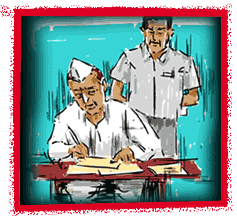The Rediff Special/ Ramesh Menon


Happiness, they say, is a state of mind.
ACT I
Ask Ram Ashray Paswan, Minister of State for Minor Irrigation in Uttar Pradesh, to define happiness. He will say that his being sworn in as a minister during Kalyan Singh's tenure was happiness. For he belongs to a lower middle class family from Raima Mainsir village. Even as a child, he was so interested in politics that he barely managed to study upto the secondary school level.
There was no party he did not try his luck with. He reels off a long list: the Jana Sangh, Janata Party, Lok Dal, Janata Dal, Bahujan Samaj Party and now the Lok Jana Shakti. It was this agility towards splinter groups at a time of coalition governments that helped him become minister.
He says he fought numerous elections and, though he lost many, he also won some. When he won the last assembly election on a BSP ticket from Khalilabad constituency, Sant Kabir Nagar district, in eastern Uttar Pradesh, he was thrilled. He slipped into a group that was ready to support Kalyan Singh and was rewarded with a portfolio.
Political observers ignored him and his low-profile minor irrigation ministry. But Paswan was more than happy. He had never dreamt he would become minister. He now had a car. A furnished house on the posh Dar-ul-Safa complex opposite the state assembly. And guards who saluted whenever they saw him.
ACT II
Meet Manmohan Sinha, personal assistant to Paswan. Though he had worked for Paswan for over a year, no one really knew him. Today, though, even Chief Minister Rajnath Singh is familiar with his name.
Soon after he started working for Paswan, Sinha realised his semi-educated minister barely knew anything -- he did not even know how much he earned as salary. Paswan's salary cheques would go directly to the bank. Then, Sinha would get him to sign on blank cheques, saying it was required to encash his salary. And, every month, he would give the minister Rs 5,000.
Paswan respected Sinha and trusted him implicitly. He would even address him as PAsaab.
When he found himself asked to sign more blank cheques, though, Paswan wanted to know the reason. Sinha innocently asked him if he knew the Uttar Pradesh government was bankrupt.
The minister said he did not know the details, but was aware there was a serious shortage of money. "Ah," said Sinha, "that is why I am making you sign blank cheques. I cannot fill in the amount as I have first to check whether the treasury has money or not." The cheques, ostensibly, were to pay for the minister's personal expenses when he was travelling.
In the last year, Sinha thus removed an average of over Rs 4,00,000 a month. He would retain the bulk and give the minister about Rs 1,50,000, telling him he was legally allowed to keep the money.
When he was on tour, Sinha would make the minister pay for the petrol, saying the government bore only 50 per cent of the cost. Sinha, as personal assistant accompanying the minister, said he would pay 10 per cent, but Paswan would have to pay 40 per cent.
One particular month, Paswan found he had paid Sinha Rs 12,000 for petrol and complained his tours were very expensive. He told Sinha he would avoid going out on tours as far as possible, even as he wondered how other ministers managed to constantly travel the length and breadth of the state.
Paswan had also signed bills showing he had drunk tea worth Rs 1,50,000 in one year.
Yet, he never suspected Sinha.
ACT III
One day, Paswan came to know all his ministerial colleagues earned Rs 15,500 every month. He could not understand why he was singled out for such a low salary. He asked Sinha; after all, his PA knew everything. Sinha had a ready explanation: Since he was "minor irrigation minister, he was getting just Rs 5,000."
Paswan who, till then, was happy with his ministerial status, was suddenly unhappy. He marched to Kalyan Singh's office and demanded a portfolio change. The chief minister was surprised; he told him it was a good ministry and wondered why he wanted a change. Paswan wanted 'minor' removed from his designation since that was why he got only Rs 5000 as salary.
The money-savvy Singh smelt a rat. It did not take him long to figure out Paswan's personal assistant was up to mischief. He quickly ordered a vigilance inquiry. When Rajnath Singh took over as chief minister, he too took an interest in the inquiry.
ACT IV
"I'm a simple, straightforward man," says Paswan, dressed in the mandatory khadi kurta, dhoti, Gandhi cap. "I won the election because of behenji's (Mayawati) blessings. By sheer luck, I became a minister. I didn't know anything so my PAsaab looted me. He has become rich at my expense."
Meanwhile, the vigilance inquiry proceeds. The investigating officers say the fact that Paswan's signatures are on all the documents and cheques weakens the case against Sinha. They may now only be able to charge him with disappopriate income.
Sinha says the charges against him are trumped up by the minister, whose demands he could not fullfill.
"In my entire life," says Paswan, "I have never made charges against anyone, let alone file a police complaint. My PAsaab completed betrayed my trust. I never ever suspected someone could do something like this. I don't want to see him again; it will remind me of how I was fooled for more than a year. God knows how much of my money he has taken away. I hope justice will be done someday."
Sinha is now personal assistant to Minister for Rural Engineering Har Narayan Rajbhar.
In Uttar Pradesh, such miracles never stop happening.
Illustration and page design: Dominic Xavier
The Rediff Specials